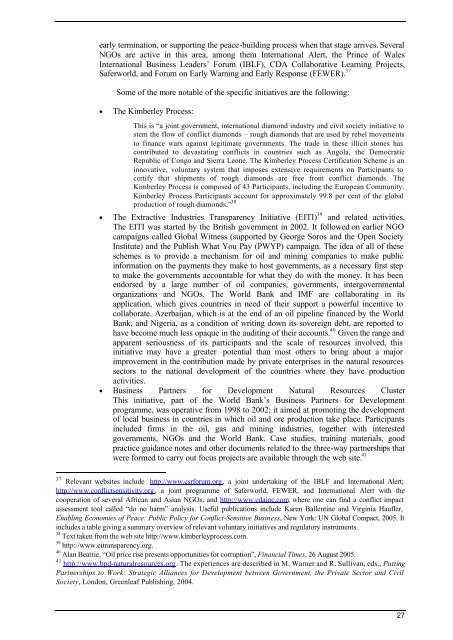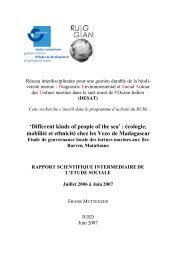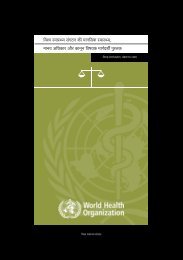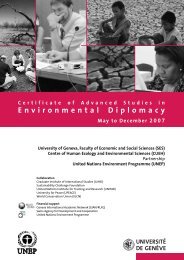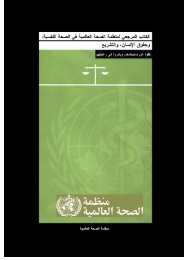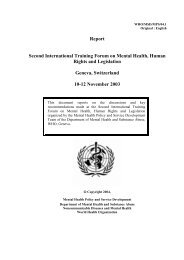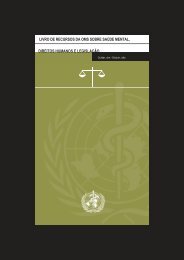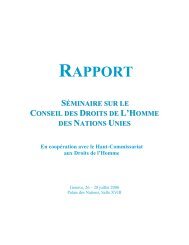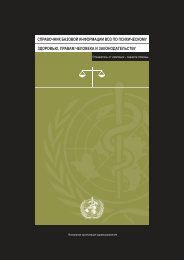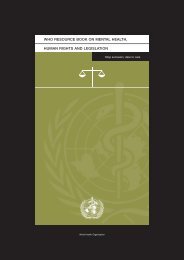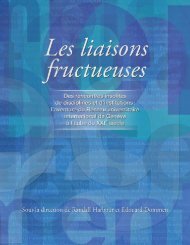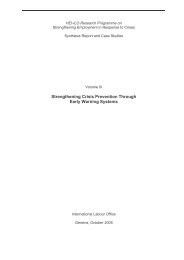into the armies are thereby also attributed to the resource-based industries. 35 The revenuesfrom the exploitation of the resources have been diverted in non-transparent ways forprivate benefit and for use by governments and rebel movements to sustain their militaryefforts aimed at prevailing in an internal conflict. This pattern has been seen withdiamonds in Angola and Sierra Leone, gold in the Democratic Republic of Congo, and oilin a number of countries including Angola and Sudan. If monies paid by the MNEs to hostgovernments, or to armed movements that control the territories where their operationstake place, are stolen or used in illegitimate ways, then the question arises whether thecompany concerned has been complicit in human rights abuses. In such circumstances it isalso difficult to maintain that the companies’ activities are contributing to economicrecovery and peace-building.The second concern is that the resource-based sectors generate little employment,especially for local workers, that they are often not effectively linked to the localeconomies, that the resulting exports lead to an over-valued real exchange rate withharmful effects on farmers and other producers of tradable goods, and that the result islikely to accentuate income and wealth disparities and aggravate the problem of poverty. Insome countries with a high absorptive capacity, based on a relatively large population andsomewhat developed industrial base, these negative effects may be less pronounced, sothat they are offset by the undoubted positive ones, such as the contributions togovernment revenue and the foreign trade balance. But oil and mineral resources arecommonly found in otherwise poor countries which are not populous or industrialized. 36Both of these concerns have developed in recent years in parallel with the elaborationof the concept of corporate social responsibility, and the corporate world has initiated orparticipated widely in initiatives taken to respond to them, as befits their endorsement ofthat concept. Participants in these actions have included the companies themselves,individually or through their associations; and the associations have included both preexistingbodies with general or sectoral mandates and ad hoc groupings of companiesformed for a specific initiative. Also participating have been a wide variety of NGOsincluding International Alert, the Clinton Foundation and Human Rights Watch; and anumber of intergovernmental organizations, including the UN, the World Bank/IFC andthe IMF. While the companies are concerned to protect their reputations and their businessinterests, the international financial institutions are concerned to protect the integrity oftheir lending operations.The initiatives are both general and specific. An example of the former is the conceptof “conflict-sensitive” business practices, which has been developed in response to theexperiences of countries like Angola, Sierra Leone and the Democratic Republic of Congowhere, in effect if not necessarily intent, revenues derived from companies’ naturalresource exploitation served to finance the armies and weapons that waged the wars andthus sustained if they did not actually cause the conflicts. This concept reflects a belief thatif companies are sensitive to the ways in which their economic activities relate to thebroader politico-military situation, they will be better able to conduct their affairs so as to(a) at a minimum “do no harm” and (b) play a role in preventing the conflict, assisting its35 See for example Human Rights Watch, Some Transparency, No Accountability: The Use of Oil Revenue inAngola and its Impact on Human Rights, January 2004, Vol. 16, No. 1(A); and Human Rights Watch, The Curseof Gold: Democratic Republic of Congo, 2005. http://www.hrw.org.36 See Alan Gelb et al, Oil Windfalls: Blessing or Curse (New York: World Bank and Oxford University Press,1988; Jon McLin, Social and Economic Effects of Petroleum Production in non-OPEC Developing Countries,Geneva: ILO, 1986; Carlos Leite and Jens Weidmann, “Does Mother Nature Corrupt? Natural ResourcesCorruption and Economic Growth,” International Monetary Fund Working Paper, July 1999; and Terry LynnKarl, The Paradox of Plenty: Oil Booms and Petro States, Berkeley: University of California Press, 1997. Recentliterature and web sites dealing with this issue are referenced and discussed in “The devil’s excrement: Is oilwealth a blessing or a curse?”, The Economist, 22 May 2003. A succinct recent statement of the issue as it pertainsto Africa is found in Pierre Jacquet, “Pétrole maudit”, Le Monde, 19 September 2005.26
early termination, or supporting the peace-building process when that stage arrives. SeveralNGOs are active in this area, among them International Alert, the Prince of WalesInternational Business Leaders’ Forum (IBLF), CDA Collaborative Learning Projects,Saferworld, and Forum on Early Warning and Early Response (FEWER). 37Some of the more notable of the specific initiatives are the following:• The Kimberley Process:This is “a joint government, international diamond industry and civil society initiative tostem the flow of conflict diamonds – rough diamonds that are used by rebel movementsto finance wars against legitimate governments. The trade in these illicit stones hascontributed to devastating conflicts in countries such as Angola, the DemocraticRepublic of Congo and Sierra Leone. The Kimberley Process Certification Scheme is aninnovative, voluntary system that imposes extensive requirements on Participants tocertify that shipments of rough diamonds are free from conflict diamonds. TheKimberley Process is composed of 43 Participants, including the European Community.Kimberley Process Participants account for approximately 99.8 per cent of the globalproduction of rough diamonds.” 38• The Extractive Industries Transparency Initiative (EITI) 39 and related activities.The EITI was started by the British government in 2002. It followed on earlier NGOcampaigns called Global Witness (supported by George Soros and the Open SocietyInstitute) and the Publish What You Pay (PWYP) campaign. The idea of all of theseschemes is to provide a mechanism for oil and mining companies to make publicinformation on the payments they make to host governments, as a necessary first stepto make the governments accountable for what they do with the money. It has beenendorsed by a large number of oil companies, governments, intergovernmentalorganizations and NGOs. The World Bank and IMF are collaborating in itsapplication, which gives countries in need of their support a powerful incentive tocollaborate. Azerbaijan, which is at the end of an oil pipeline financed by the WorldBank, and Nigeria, as a condition of writing down its sovereign debt, are reported tohave become much less opaque in the auditing of their accounts. 40 Given the range andapparent seriousness of its participants and the scale of resources involved, thisinitiative may have a greater potential than most others to bring about a majorimprovement in the contribution made by private enterprises in the natural resourcessectors to the national development of the countries where they have productionactivities.• Business Partners for Development Natural Resources ClusterThis initiative, part of the World Bank’s Business Partners for Developmentprogramme, was operative from 1998 to 2002; it aimed at promoting the developmentof local business in countries in which oil and ore production take place. Participantsincluded firms in the oil, gas and mining industries, together with interestedgovernments, NGOs and the World Bank. Case studies, training materials, goodpractice guidance notes and other documents related to the three-way partnerships thatwere formed to carry out focus projects are available through the web site. 4137 Relevant websites include http://www.csrforum.org, a joint undertaking of the IBLF and International Alert;http://www.conflictsensitivity.org, a joint programme of Saferworld, FEWER, and International Alert with thecooperation of several African and Asian NGOs, and http://www.cdainc.com, where one can find a conflict impactassessment tool called “do no harm” analysis. Useful publications include Karen Ballentine and Virginia Haufler,Enabling Economies of Peace: Public Policy for Conflict-Sensitive Business, New York: UN Global Compact, 2005. Itincludes a table giving a summary overview of relevant voluntary initiatives and regulatory instruments.38 Text taken from the web site http://www.kimberleyprocess.com.39 http://www.eitransparency.org.40 Alan Beattie, “Oil price rise presents opportunities for corruption”, Financial Times, 26 August 2005.41 http://www.bpd-naturalresources.org. The experiences are described in M. Warner and R. Sullivan, eds., PuttingPartnerships to Work: Strategic Alliances for Development between Government, the Private Sector and CivilSociety, London, Greenleaf Publishing, 2004.27
- Page 1 and 2: HEI-ILO Research Programme onStreng
- Page 3: PrefaceThis three-volume series res
- Page 7 and 8: Table of contentsPreface...........
- Page 9: The Private Sector and Social Partn
- Page 13: Executive summaryPrivate enterprise
- Page 16 and 17: IGOs, NGOs—tend to exclude, or at
- Page 18 and 19: • The World Bank has created a kn
- Page 20 and 21: 2. Private enterprises in conflict-
- Page 22 and 23: Figure 1: The Private Sector Employ
- Page 24 and 25: 2.3. Case study: Promoting multi-et
- Page 26 and 27: downstream, i.e. refining and distr
- Page 28 and 29: Box 1: How does Somalia’s private
- Page 30 and 31: Sectoral aspectsthere will be added
- Page 32 and 33: inequities in pricing. “Of the 16
- Page 36 and 37: 3. Private enterprises and social p
- Page 38 and 39: Two natural disasters which have be
- Page 40 and 41: Box 4: Cooperatives in crisis respo
- Page 42 and 43: partners, the tripartite cooperatio
- Page 44: 36forces and that are able to perfo
- Page 48: AcknowledgmentsThe authors of this
- Page 51 and 52: 6.2. Delimiters of women’s econom
- Page 54 and 55: Executive summaryDespite the rich n
- Page 56 and 57: 1. IntroductionSince 1979, under th
- Page 58 and 59: 2. Country profileThe Republic of I
- Page 60 and 61: • activities related to reconstru
- Page 62 and 63: for university education concerning
- Page 64 and 65: 2.4. Economic environment assessmen
- Page 66 and 67: Unemployment (15 years of age and a
- Page 68 and 69: 2.5. PerspectivesDespite devastatio
- Page 70 and 71: 3. The rationale of SME sector deve
- Page 72 and 73: 4. Iraq's SME sector: A profile4.1.
- Page 74 and 75: The Private sector employment pyram
- Page 76 and 77: Table 8: Estimates of total formal
- Page 78 and 79: Feasibility study: almost all respo
- Page 80 and 81: Table 9: Percentage of female entre
- Page 82 and 83: Factors for public sector preferenc
- Page 84 and 85:
The recessionary indication of busi
- Page 86 and 87:
Special investment legislation and
- Page 88 and 89:
8. Small entrepreneurs in Iraq: Sto
- Page 90 and 91:
a reasonable income and independenc
- Page 92 and 93:
9. RecommendationsSME-development s
- Page 94 and 95:
Longer-term SME developmentBesides
- Page 96 and 97:
• literature and artistic service
- Page 98 and 99:
2. List of interviews with governme
- Page 100 and 101:
11. Why did you decide establishing
- Page 102 and 103:
33. What are the cost components of
- Page 104 and 105:
59. Are you working on a project, o
- Page 106:
Promoting multi-ethnic stakeholder
- Page 109 and 110:
101
- Page 111 and 112:
103
- Page 113 and 114:
105
- Page 115 and 116:
107
- Page 117 and 118:
109
- Page 119 and 120:
Research methodologyThe research te
- Page 121 and 122:
possibility of conflict. In 1992, a
- Page 123 and 124:
2.2.2. PovertyAfter the break-up of
- Page 125 and 126:
of almost 10 per cent of GDP, yet i
- Page 127 and 128:
Source of initial financing: privat
- Page 129 and 130:
‘It is important to point out tha
- Page 131 and 132:
4.2. The economic resilience of int
- Page 133 and 134:
medium-sized companies employing 24
- Page 135 and 136:
5.2. Addressing constraints for SME
- Page 137 and 138:
5.4. Support to local initiativesSM
- Page 139 and 140:
ConclusionConsidering the actual an
- Page 141 and 142:
Scott, Norman: Macedonia: A Brief E
- Page 143 and 144:
Official gross reserves 4 290 450 7
- Page 145 and 146:
4. Survey questionnaire1. Name of t
- Page 147 and 148:
139
- Page 149 and 150:
141
- Page 151 and 152:
143
- Page 153 and 154:
2. Le contexte2.1. Le paradoxe ango
- Page 155 and 156:
Composition et description des Futu
- Page 157 and 158:
Les généraux angolais sont prése
- Page 159 and 160:
Les syndicats officielsL’Union na
- Page 161 and 162:
Une étude réalisée en 2003 pour
- Page 163 and 164:
3.3. Sortir du cercle vicieux : vie
- Page 165 and 166:
Annexes1. Morceaux choisis : le «
- Page 167 and 168:
159
- Page 169 and 170:
L’implication des partenaires soc
- Page 171 and 172:
Table des matièresTable des matiè
- Page 173 and 174:
RemerciementsQu’il me soit permis
- Page 175 and 176:
Liste des acronymesAFASPAALEANEAANS
- Page 177 and 178:
GlossaireAide d’urgence :Aléa :A
- Page 179 and 180:
Résumé exécutifAu cours des dix
- Page 181 and 182:
1. IntroductionLe département de R
- Page 183 and 184:
Limites de l’étudeAvant de proc
- Page 185 and 186:
évalué à plus de deux milliards
- Page 187 and 188:
2.2.2. Aspects démographiquesLes p
- Page 189 and 190:
2.3.3. EducationDès l’indépenda
- Page 191 and 192:
création de fonds de stabilisation
- Page 193 and 194:
3. Analyse des formes de réponse :
- Page 195 and 196:
• le secteur de l’Eau sera dest
- Page 197 and 198:
• la révision de la législation
- Page 199 and 200:
de main-d’œuvre, encourageant la
- Page 201 and 202:
leur fournissait les équipements e
- Page 203 and 204:
matérielle sous des formes diverse
- Page 205 and 206:
centre de l’attention des partena
- Page 207 and 208:
• le rôle dévolu à la commissi
- Page 209 and 210:
Renforcer le rôle de solidarité d
- Page 211 and 212:
ConclusionLa dimension de la tache
- Page 213 and 214:
Equipe Multidisciplinaire pour l’
- Page 215 and 216:
2. Séries statistiquesTable 8 : Ev
- Page 217 and 218:
Table 11 : Répartition de la popul
- Page 219 and 220:
Table 2 : Liste détaillée des com
- Page 221 and 222:
Table 4 : Dispositif d’interventi
- Page 223 and 224:
Organisation de l’unité syndical
- Page 225 and 226:
- Centre technique de construction.
- Page 227:
219


